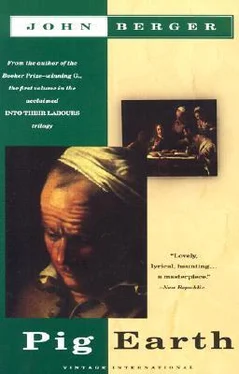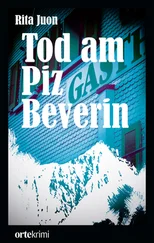Jésus! What is Marcel going to say? asked Nicole, as the tractor approached the farm.
She waved at her son Edouard on the driving seat. He drove past what remained of the manure heap and turned into the yard. There he climbed down and left the engine running. The tractor was blue.
I got it cheap, he shouted to his mother. It’s twelve years old!
Nicole smiled encouragingly. She forgot anxieties as soon as they were over, and was reluctant to foresee the ones approaching.
He’ll only be against it because he can’t drive! Edouard said.
The father led the mare and empty cart into the yard. When he saw the tractor he stopped, and folded his arms on his chest.
What is it? he asked as if he had never seen a tractor before.
I’ve bought it! shouted Edouard against the noise of the engine.
The son stood with his elbow resting on the vibrating bonnet as if it were the shoulder of a girl, and his foot on the small front wheel. He was dressed in the clothes he wore to go to market: a pink shirt, blue jeans and ex-army suede boots.
The father would not approach nearer, and at such a distance the noise of the engine made everything inaudible.
What have you bought it for?
Nineteen sixty-three! bawled Edouard. Twelve years old.
It’s only four months ago that I bought the new mare. Marcel seemed unaware that nobody could hear his words. When the horse butcher took the last Gui-Gui away, I came into the kitchen and I held up the empty bridle, the bridle she had worked with for fifteen years and I said to you: Do you know what this means? And you replied: It means a tractor! And I said: No, it means Gui-Gui has gone! It does not mean a tractor in God’s name!
It’ll pull twenty tons!
The motor hesitated and stopped.
What do you say? demanded Edouard.
I say it’s no use to us! said Marcel, unharnessing Gui-Gui the Second, and leading her into the stable.
In the evenings Marcel became sleepy. The lids came down over his slate-coloured eyes and his lower lip protruded a little. It was then that he looked his age.
You were ungrateful, Nicole told him. He bought it out of his savings.
He bought it because he can’t help buying, Marcel replied, yawning.
She nudged him, not angrily but brusquely, and handed him a brochure. He gave me this, to show you.
He turned the pages carefully as if turning them was the last job of the day. The backs of his hands were smooth, they might have been the hands of a baker; their palms were calloused and engrained like the wood of the tipcart.

They are beautiful, how could they not be beautiful? he said. Men have dreamt of machines like this for centuries. Who would believe that my mother carted earth in a wheel-barrow from the bottom to the top of her field for ten days on end? With a tractor it would have taken half an afternoon.

If we had that machine, we’d get the hay in in eight days!
LIBERATOR
avec encore plus de confort
They promise everything. Look at their colours — yellow, blue, red, bright green: they promise the world!
He walked to the door. False promises! He shouted the two words out very loud.
A few minutes later he came back, buttoning his fly.
Do you know what those machines are for?
They plough, they turn hay, they spread dung, they milk — it depends, answered Nicole.
There’s one job they all do.
He looked into her eyes with the utmost seriousness. For all their experience, Nicole’s eyes were innocent. They had seen illness, they had seen farms on fire, they had seen people work themselves to the grave, they had seen women agonising in labour, but they had never seen men poring over a map and drawing up a plan.
Their job is to wipe us out.
All Edouard did was to save enough money to buy a secondhand tractor, said Nicole.
Marcel took off his beret and his leather jacket and started unbuttoning his shirt. She looked straight at him.
You can’t always expect things to stay the same, Marcel.
There are only two machines worth having here—
Nicole interrupted him.
Do you know what I think?
She was taking the pins out of her hair. Unpinned, it came down to her waist.
I think you’re furious about the tractor because you can’t drive!
If I wanted to, I could learn! Marcel answered.
This made her laugh. The flesh of her arms, immense after forty years of milking, moved as if she were dancing when she laughed.
Why not? he demanded.
Oh la! la! she sighed between bursts of laughter. What did I pick out of the lottery?
In the prison at B …, Marcel answered her question: she married a bandit without knowing it.
The day after Edouard bought the tractor, Marcel continued distributing the winter manure. The leaf-buds on the apple trees were opening, the tiny leaves so young that they were almost colourless, and wrinkled from being folded, like all new-born skin. His body felt old and its joints were stiff from the winter. Each forkload of dung had to be lifted into the cart. After filling three carts and stepping out each time with the mare as she tugged the cart to the top field, a hundred and fifty metres higher than the house, his spine pained him, and with every forkload lifted, two bars of ache twisted inwards at the bottom of his stomach making his balls hurt. That day the noises he made to Gui-Gui were sometimes the complaints of his own body.
The day before he had taken up twelve cartloads. His right elbow was sore and bleeding a little from where the striding beside the mare had knocked his arm against a harness hook on the horse’s collar. One cart made four heaps, three dragged out with a hoe and the last one tipped.
He stood, looking down at the farm, the valley, the village, the cemetery, the road that led away. Whilst he stood there he didn’t move any part of his body, so that all parts should rest. He knew exactly where he would lie in the cemetery. Looking down from there at the cemetery, he explained the machines to himself.
On the flat plains the poor have no choice but to work for the rich. By themselves the poor, working only for money, would have neither the energy nor the heart to produce enough to create wealth. This is where machines came in, long ago. Machines make monkey-work productive, and the wealth they create goes to those who own the machines. On the plains I would not have this hernia of an ache because a machine would be lifting dung onto another machine which would transport it and scatter it.

When he was reloading the cart in the yard he stopped to straighten his back. He could see the piles of dung arranged in three straight lines with geometrically regular intervals in the top field by the forest. At that distance they looked scarcely larger than the beads of a rosary. Seventy-two Hail Marys.
On the plains there will be no more peasants.
By the evening he had shifted his thirteen cartloads.
They had four children. Michel, their eldest son, and their two daughters, Marie-Rose and Danièle, were married. Edouard, who still lived at home, was the youngest. When he left the local school, Edouard had gone to the technical school at A … and there obtained his trade certificate as a garage mechanic. No jobs existing in the local garages, he went into a factory. After a few months at the factory he made friends with some forains and left the factory to begin working with them in the local markets. From an early age Edouard had the reputation of being lazy. He himself said: I’m willing to work as hard as the next person, but I’m not a fool and I’m not going to work for nothing.
Читать дальше















